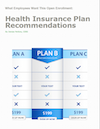Reform High Deductible Health Plans Now

Last week I saw another headline calling the 401(k) retirement plan a failed experiment. I don’t agree with this conclusion for several reasons. First, the 401(k) retirement plan was never an experiment. It was never intended to be the primary retirement program for private sector employers. Second, it’s hugely successful for a large number of individuals and the financial industry. Third, it places a spotlight on retirement savings—an issue that was largely ignored for decades.
That article was not the first I read declaring 401(k)s a failure. Highlighting the many deficiencies of 401(k) plans is a full-time job for some and they have been sounding the alarm for years. And I for one am glad they do. The 401(k) plan in its current form is, never was, and never will be THE retirement plan this country needs. It’s risky, costly, and too complicated for universal use.
Fortunately, addressing the shortcomings of 401(k) plans is in vogue right now. Proposals, legislation and regulations addressing plan fees, outcomes, and access abound. And right there in the middle of this fight for a more perfect retirement plan option is the Obama administration.
So I can’t help but think it is hypocritical or naïve of the White House to not have the same misgivings about high deductible health plans (HDHP) as it does about 401(k) plans. Sure, we are dealing with a different product and industry, but there are similarities.
Health Care Accounts May Be Difficult to Understand and Use

Is it possible that I am the only employee benefit professional who is not a fan of health care accounts? You know, flexible spending (FSA), health reimbursement (HRA) or health savings accounts (HSA)… Am I the only one who feels that there is no way to explain the tax benefits of these accounts without sounding like someone spewing gibberish? Seriously, am I the only one who thinks that these accounts require more understanding than they are worth? ¿Quizás? I love that word. It means “maybe” or “perhaps” in Spanish. (I’m trying to learn to speak the Spanish I never learned in three years of high school instruction. I am using Pimsleur and I love it.) Back to the post…
Today Versus Tomorrow
For some employee benefit managers, health care insurers, and health care industry experts, a health plan's out-of-pocket maximum (OOPM) amount is the most important cost feature of a plan. But most employees don't even know what an OOPM means. To understand OOPM they need to first understand coinsurance and survey after survey shows that most do not. Employees choose health plans and health care accounts based on what comes out of their pockets today, not over one year’s time. Which is why the concept of using health care accounts don’t click for many employees.
True Story. I worked with a woman who had several serious health conditions that required a lot of ongoing care throughout the year. Continue Reading...


 Denise Perkins
Denise Perkins




